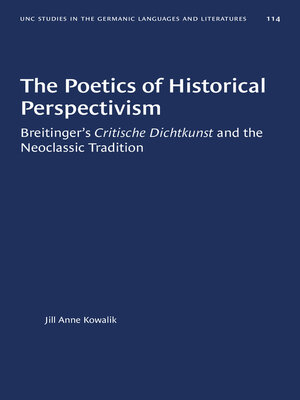The Poetics of Historical Perspectivism
ebook ∣ Breitinger's Critische Dichtkunst and the Neoclassic Tradition · University of North Carolina Studies in Germanic Languages and Literature
By Jill Anne Kowalik

Sign up to save your library
With an OverDrive account, you can save your favorite libraries for at-a-glance information about availability. Find out more about OverDrive accounts.
Find this title in Libby, the library reading app by OverDrive.



Search for a digital library with this title
Title found at these libraries:
| Library Name | Distance |
|---|---|
| Loading... |
Jill Kowalik reevaluates J. J. Breitinger’s Critische Dichtkunst (1740) with regard to a heretofore neglected aspect of aesthetics in the early eighteenth century, namely how poesis and historiography could increasingly come to resemble each other in their assumptions, purposes, and methods of representation. The central argument states that historians of this period began to utilize the concept of historical perspectivism only after its development as an interpretive tool by the aesthetic thinkers of the early Enlightenment.
The Critische Dichtkunst is examined in terms of three disparate traditions: the modern reception of Aristotle’s Poetics, Horace’s Ars poetica, and the Quarrel between the Ancients and the Moderns; the model of consciousness proposed by Leibniz that describes the mind as a ceaseless process of historical intellective integration; and the German reception of French neoclassical authors, especially Dubos, whose notion of historical probability was radicalized by Breitinger and later appropriated by poets and historians alike.
The Critische Dichtkunst is examined in terms of three disparate traditions: the modern reception of Aristotle’s Poetics, Horace’s Ars poetica, and the Quarrel between the Ancients and the Moderns; the model of consciousness proposed by Leibniz that describes the mind as a ceaseless process of historical intellective integration; and the German reception of French neoclassical authors, especially Dubos, whose notion of historical probability was radicalized by Breitinger and later appropriated by poets and historians alike.







